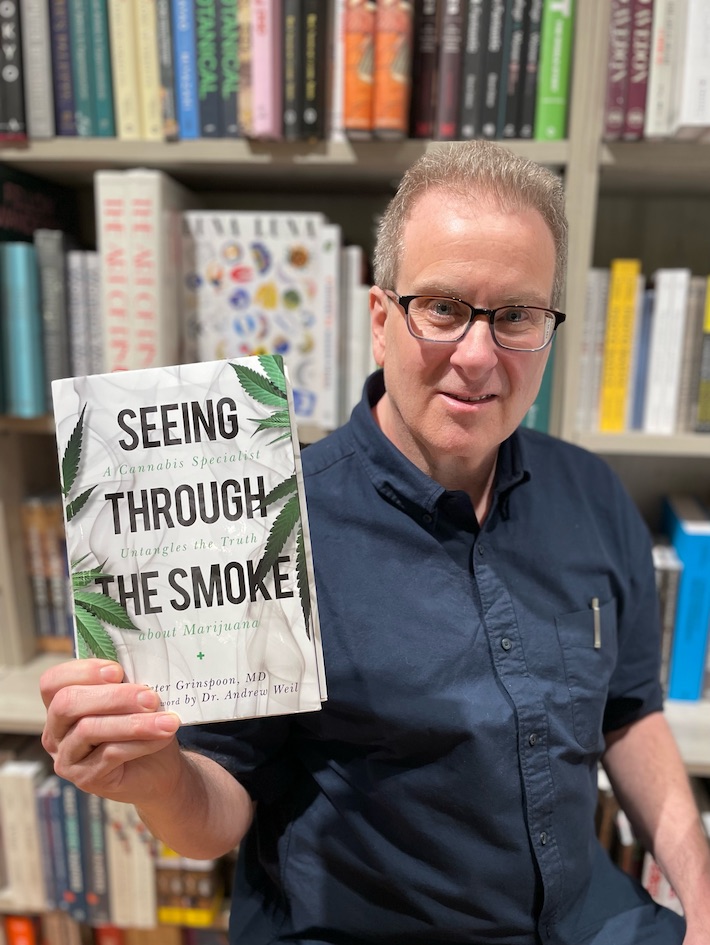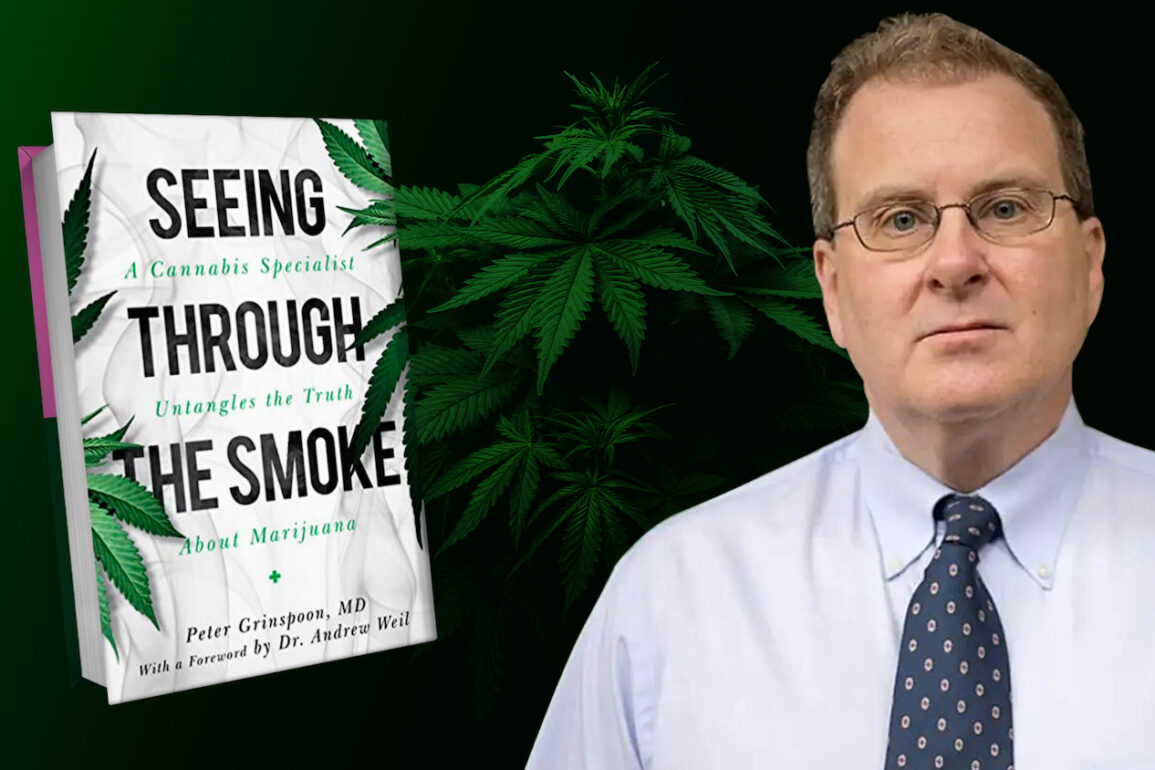Dr. Peter Grinspoon is a lot of things: a primary care physician, a Harvard instructor, and even a certified health and wellness coach. But, what’s made him most highly regarded in our industry is his expertise in the world of cannabis.
As a cannabis specialist at Massachusetts General Hospital, Grinspoon gets to experience medical marijuana in a whole new way. In his latest book, Seeing Through the Smoke: A Cannabis Specialist Untangles the Truth About Marijuana, Grinspoon tackles the ins and outs of cannabis, revealing the stigmas, truths, and findings about the plant that everyone should know — yet no one seems to.

We’ve had the pleasure of chatting with Dr. Grinspoon about his book and more, giving you an even better insight into the cannabis knowledge this specialist has to offer.
Navigating Cannabis Truths and Stigmas in Grinspoon’s Latest Book
Seeing Through the Smoke is all about providing readers with accurate, comprehensive information about the world of cannabis — and this includes expelling some of the biggest rumors the industry’s experienced.
Grinspoon talks extensively about the history of cannabis in the US and the fact that, despite popularity in the past, the stigmas of medical marijuana run deep not only at the political level, but at the medical level, too. And, unfortunately, it’s been like this for quite some time.
“As my father, the late Dr. Lester Grinspoon ([also a] cannabis specialist), said, doctors have been both perpetrators of, and victims of, the vast information campaign against cannabis by the US government,” Grinspoon confidently points out.
But, fixing these structural stigmas isn’t an easy or quick task: “To evolve beyond this stigma, we need education, lived and clinical experience, and the humility and initiative to unlearn the nonsense they’ve been taught, to listen to their patients, and to (re)learn a new facet of medicine: cannabinoid therapy.”
Grinspoon goes on to mention that other doctors need to be better versed in cannabis science and that it’s integral for psychiatrists specifically to avoid the narrative that “cannabis makes all mental health conditions worse”.
Since his book tackles so much about marijuana stigmas, we wanted to know what one of the biggest untruths about cannabis was that Grinspoon wanted the everyday person to know about. And his answer was simple: “Anything the DARE program or the US government said.”
What the World Still Needs to Learn About Weed — According to Grinspoon
When it comes to eliminating these common myths about cannabis and embracing the plant in the right — safest — ways, Dr. Grinspoon says that the key is education.
These days, people simply don’t know enough about medical cannabis; more than that, they don’t know beyond what they’ve heard through the grapevine. And, unfortunately, this information tends to be incorrect at the very least.
So, as both a health and wellness coach and an instructor at Harvard, we asked Grinspoon how (or if) he addresses the topic of medical cannabis with his students. And of course, he does: “I tell the truth about [cannabis], which is a rarity in medical education!”
The doctor goes on to mention that he discusses both harms and potential benefits of the plant, all without romanticizing cannabis as a whole.
“I am clear-eyed about the potential harms,” Grinspoon explains. “I suggest people use the smallest effective dosage; cannabis is a tool to help people achieve their goals, not an end or treatment in and of itself.”
With the rapidly evolving landscape of cannabis legalization and the emergence of new medical treatments, we also wanted to know what Grinspoon thinks are the most pressing research needs or gaps in our general understanding of cannabis. In other words, what do we still need to know to have a better relationship with cannabis overall?
“We need to learn (and teach) much more about the [endocannabinoid system], about potential drug interactions between cannabis and traditional pharmaceuticals, about the ways in which cannabis works as a gateway off of addiction for so many people, and about how to standardize dosages to make research more consistent and interoperable,” to name a few, the doctor says.
Essentially, the overwhelming amount of misinformation, negative stigma, and residual discrimination from the Drug War are all problems that must be addressed within the cannabis community, and a lot of it starts with proper education — something that Grinspoon strives to provide every day.
How Grinspoon Addresses Both the Positives and Negatives of Cannabis Consumption
Along with looking at cannabis’s perspective through the country’s lens, Grinspoon also takes the time to address both the harms and benefits of cannabis in his latest book. The doctor understands that knowing both sides of the story is integral, especially when the idea of medical cannabis is so fragmented in the US.
With this in mind, we asked what research has to say about some of the most concerning aspects of cannabis consumption, as well as its implications on youth versus adults.
“We overemphasize high THC at the expense of other, more medicinal cannabinoids,” Grinspoon says. “Cannabis can be addictive and this addiction needs to be treated with skill and empathy. I am particularly concerned about heavy usage before the age of 18.”
The doctor goes on to say that the industry, as it stands, is way too focused on making money, and chooses to gloss over many of the potential harms that the plant can cause. And, while it has so many great benefits, you cannot talk about one without mentioning the other.
Speaking of benefits, though, one of the major points that Grinspoon makes in his work is the role that cannabis can play in potentially combatting the opioid crisis. When asked about this, the doctor explained that “cannabis is a safer alternative for chronic pain than opioids, and it’s also extremely effective as an adjunct for people getting off or cutting down on opioids.”
He mentions that he offers current opioid patients the chance to switch to marijuana consumption — voluntarily, of course — and sees the quality of life of his patients improve dramatically. In fact, the doctor refers to this process as being a part of harm reduction, which is a perspective you don’t often see in the cannabis industry.
“Cannabis is just one more tool in our toolbox, that it really is effective for some people,” Grinspoon elaborates. “I encourage people to approach this issue from a ‘blank slate,’ to read widely about benefits and harms, and to listen to their patients.” (He’s talking to you, doctors.)
The Future of the Cannabis Industry from Grinspoon’s POV
When we look into the future, the kinds of developments and advancements that the industry may go through can often feel a bit muddy. After all, cannabis legislation and regulation haven’t had the best history in our country, and it seems as though we’re faced time and time again with rejection and failure. So, we turned to Grinspoon, asking what kind of progress he hoped to see, and how these changes could impact the industry as we know it.
“Full legalization,” the doctor responded hopefully. “Decreased stigma. More usage in older patients, which helps with polypharmacy and improves quality of life. Better physician education. Lots of research into the ECS with some useful and fascinating drug development on the horizon.” And, he ended it with a simple reiteration: decreased stigma.
At the end of the day, if there’s one thing that Dr. Grinspoon wants to get across, it’s that decreasing the stigma around cannabis and increasing education surrounding the plant is key to transforming the industry into one we can be proud of — one that’s open and accepting of cannabis consumption, just as it was back in the 1800s.
If you want to learn more about Grinspoon’s perspectives or what his research has proved, you can read about it extensively in his latest book, Seeing Through the Smoke.

